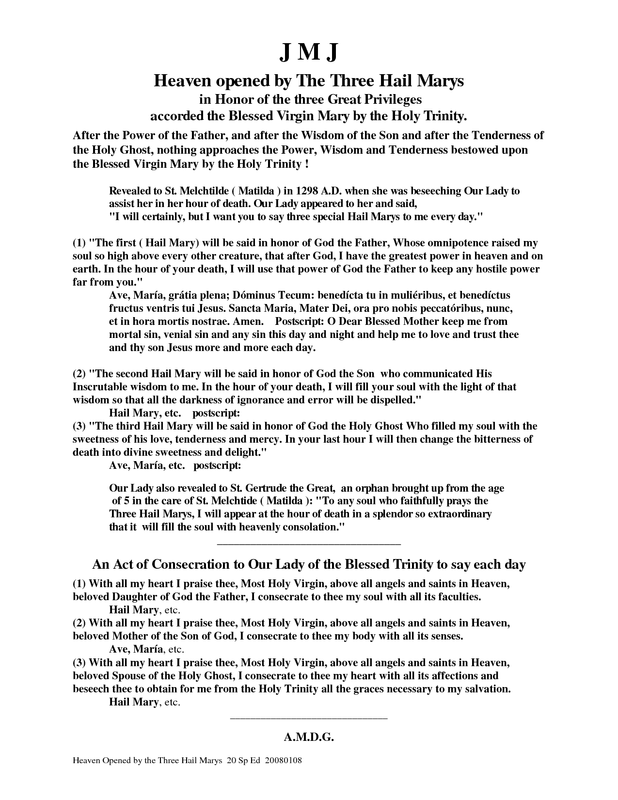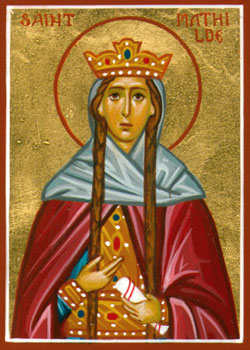 As Santa Matilda begged to the Most Holy Virgin that She help her at the hour of death, she heard that the most benign Lady said to her: "Yes I will do it; but I want you to say three Hail Marys daily to me. The first, requesting that as God Father placed me on a throne of glory without equal, making me the most powerful in Heaven and Earth, that I may attend to you on Earth for strengthen you and to separate you from all enemy power. On the second Hail Mary you will request from me that just as the Son of God filled me of wisdom, to such degree that I have more knowledge of the Most Holy Trinity than all the Saints, I will attend to you in the critical moment of death to fill your soul with the lights of the faith and true wisdom, so that they are not obscured by the darkness of error and ignorance. On the third, you will request that just as the Holy Spirit has filled me with the sweetness of his love, and has made me so loving that after God, I am the sweetest and most merciful, so that when I attend you at death filling your soul with such smoothness of divine love, that all pain and bitterness of death change for you into delights." The practice of this devotion cannot be either easier, or briefer. Easy, because all we have to do is pray every day three Hail Marys, thanking the Most Holy Trinity for the gifts of Power, Wisdom, and Love, that were granted to the Immaculate Virgin, and urging to Mary to use them for our assistance. Method to practice this devotion: Every day, pray the following: Mary, my Mother; do not let me commit mortal sin! 1 By the Power that the Eternal Father granted you. (Say one Hail Mary) 2 By the Wisdom that the Son granted you. (Say one Hail Mary) 3 By the Love that the Holy Spirit granted you (Say one Hail Mary)  Will the movement of heavenly bodies cease? Yes But not from a natural cause. Final end of movement will still be present that is to imitate Divine Goodness in its causality over inferiors. Instead by the action of the Divine will. Man will no longer need service of physical bodies for sustenance (growth and generation), but only for sense knowledge, to see with the eyes the wonders of God. St Thomas. 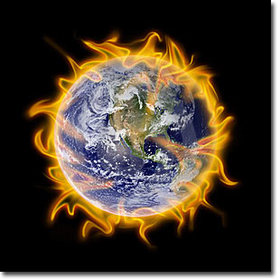 Will the World be renewed? St. Thomas Answers, Yes. From 1. A new Heaven and Earth, Isaiah 65:17 2. First Heaven and Earth passed away. Apoc. 21:1 3. Wherein justice dwells according to His promises 2 Pet. 3:13 4. Man naturally loves the World as a creature of God and is part of it, from its clay, so to speak, so he desires its good. Therefore his natural desire is for its happiness to be attained and this will not happen until the World is improved by renewal. Conclusion Bodily things served man in 2 ways: 1. By sustaining bodily life. This is not necessary in glorified man because the divine power which glorifies the soul will make his body completely incorruptible. 2. By enabling him to know God. From visible creatures. Rom. 1:20. This will not be necessary with respect to intellectual knowledge because intellect will immediately see God by His essence. But it will be necessary for the World to be renewed with respect to the senses which are not capable to attain or see the Divine Essence. Thus they will be satisfied in a proportionate manner as they can’t see God immediately, but only through His physical effects, which are: 1. Glorified Body of Christ 2. Glorified Bodies of the Blessed 3. Other physical bodies of the World thus renewed by perfection & Glory, but no change in what is really consisted. Therefore the renewal of World corresponds to glorification of man. 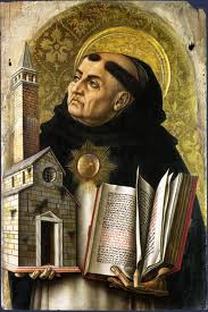 FIVE QUALITIES OF PRAYER “Our Father who art in heaven.” Among all other prayers, the Lord’s Prayer holds the chief place. It has five excellent qualities which are required in all prayer. A prayer must be confident, ordered, suitable, devout and humble. It must be confident: “Let us, therefore, go with confidence to the throne of grace.”[1] It must not be wanting in faith, as it is said: “But let him ask in faith, nothing wavering.”[2] That this is a most trustworthy prayer is reasonable, since it was formed by Him who is our Advocate and the most wise Petitioner for us: “In whom are hid all the treasures of wisdom and knowledge;”[3] and of whom it is said: “For we have an advocate with the Father, Jesus Christ the just one.”[4] Hence, St. Cyprian says: “Since we have Christ as our Advocate with the Father for our sins, when we pray on account of our faults, we use the very words of our Advocate.”[5] Furthermore, this prayer is even more worthy of confidence in that He who taught us how to pray, graciously hears our prayer together with the Father, as it is said in the Psalm: “He shall cry to Me, and I will hear him.”[6] Thus writes St. Cyprian: “It is a friendly, familiar, and devout prayer to ask of the Lord in His own words.”[7] And so no one goes away from this prayer without fruit. St. Augustine says that through it our venial sins are remitted.[8] Moreover, our prayer must be suitable, so that a person asks of God in prayer what is good for him. St. John Damascene says: “Prayer is the asking of what is right and fitting from God.”[9] Many times our prayer is not heard because we seek that which is not good for us: “You ask and you do not receive, because you ask amiss.”[10] To know, indeed, what one ought to pray for is most difficult; for it is not easy to know what one ought to desire. Those things which we rightly seek in prayer are rightly desired; hence the Apostle says: “For we know not what we should pray for as we ought.”[11] Christ Himself is our Teacher; it is He who teaches us what we ought to pray for, and it was to Him that the disciples said: “Lord, teach us to pray.”[12] Those things, therefore, which He has taught us to pray for, we most properly ask for. “Whatsoever words we use in prayer,” says St. Augustine, “we cannot but utter that which is contained in our Lord’s Prayer, if we pray in a suitable and worthy manner.”[13] Our prayer ought also to be ordered as our desires should be ordered, for prayer is but the expression of desire. Now, it is the correct order that we prefer spiritual to bodily things, and heavenly things to those merely earthly. This is according to what is written: “Seek ye first therefore the kingdom of God and His justice, and all these things shall be added unto you.”[14] Here Our Lord shows that heavenly things must be sought first, and then things material. Our prayer must be devout, because a rich measure of piety makes the sacrifice of prayer acceptable to God: “In Thy name I will lift up my hands. Let my soul be filled with marrow and fatness.”[15] Many times because of the length of our prayers our devotion grows cool; hence Our Lord taught us to avoid wordiness in our prayers: “When you are praying, speak not much.”[16] And St. Augustine says: “Let much talking be absent from prayer; but as long as fervour continues, let prayer likewise go on.”[17] For this reason the Lord made His Prayer short. Devotion in prayer rises from charity which is our love of God and neighbour, both of which are evident in this prayer. Our love for God is seen in that we call God “our Father;” and our love for our neighbour when we say: “Our Father . . . forgive us our trespasses,” and this leads us to love of neighbour. Prayer ought to be humble: “He hath had regard for the prayer of the humble.”[18] This is seen in the parable of the Pharisee and the Publican (Luke, xviii. 9-15), and also in the words of Judith: “The prayer of the humble and the meek hath always pleased Thee.”[19] This same humility is observed in this prayer, for true humility is had when a person does not presume upon his own powers, but from the divine strength expects all that he asks for. It must be noted that prayer brings about three good effects. First, prayer is an efficacious and useful remedy against evils. Thus, it delivers us from the sins we have committed: “Thou hast forgiven the wickedness of my sin. For this shall every one that is holy pray to Thee in a seasonable time.”[20] The thief on the Cross prayed and received forgiveness: “This day thou shalt be with Me in paradise.”[21] Thus also prayed the Publican, and “went down to his home justified.”[22] Prayer, also, frees one from the fear of future sin, and from trials and sadness of soul: “Is any one of you sad? Let him pray.”[23] Again it delivers one from persecutors and enemies: “Instead of making me a return of love, they detracted me, but I gave myself to prayer.”[24] In the second place, prayer is efficacious and useful to obtain all that one desires: “All things whatsoever you ask when you pray, believe that you shall receive.”[25] When our prayers are not heard, either we do not persevere in prayer, whereas “we ought always to pray, and not to faint,”[26] or we do not ask for that which is more conducive to our salvation. “Our good Lord often does not give us what we wish,” says St. Augustine, “because it would really be what we do not wish for.” St. Paul gives us an example of this in that he thrice prayed that the sting of his flesh be removed from him, and his prayer was not heard.[27 Thirdly, prayer is profitable because it makes us friends of God: “Let my prayer be directed as incense in Thy sight.”[28]
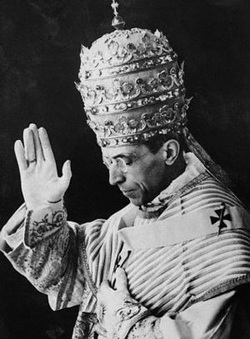 MEANING OF PRIMACY The word primacy is derived from the Latin word primus, first. The primacy of St. Peter means the office which St. Peter held (and which his successor holds today), that is, the first place in the Church of Christ. And it is not merely the first place in honour or dignity, but the first place in jurisdiction, in authority. When we say Christ conferred the primacy on St. Peter (and his successors), we mean that He made St. Peter His vicar, His direct representative clothed with His own authority, infallibly guided to lead men on the right path by exercising the office of universal teacher of faith and morals. ST. PETER'S OFFICE To prove that St. Peter (and his successors each in turn) received such a primacy as we have defined above, it will be necessary to establish the following facts: a. That Christ singled out St. Peter for a peculiar office, distinct from that of the other Apostles, of teaching and governing the whole Church by his supreme authority; b. That Christ actually conferred upon St. Peter the duties and powers of that office; c. That St. Peter actually exercised that office. Christ singled out St. Peter for the primacy. Christ is, and ever must remain the head of His Church. Yet Christ made the Church a visible society, the service and value of which must be realised here in this visible world. The Church then had to have a visible head. Christ, however, was to ascend into Heaven and to be no longer visible as Man upon earth. It is the very nature and logic of this situation that requires a visible head of the Church on earth. Now, Christ singled out St. Peter as this head for: Christ made Peter the Rock upon which the Church is built. After Peter had professed the divinity of Christ, Our Lord said to him (Matt. 16, 18): “I say to thee: That thou art the singular pronoun. This declaration had reference to Peter alone, and not to the other Apostles. Again: Christ made a special prayer for Peter, that he might not fail, telling him that the devil had wished to conquer him particularly (in view of his supreme office), and ordering Peter to confirm the others (Luke 22; 31,32): Simon, Simon, behold Satan bath desired to have you that he may sift you as wheat: but I have prayed for thee that thy faith fail not: and thou being once converted, confirm thy brethren.” Notice again that the singular pronoun makes the declaration refer to Peter alone. Peter was to confirm, i.e., to strengthen the Church as a true and solidly built foundation. Christ conferred on Peter alone the “keys,” i.e., the supreme mastership of the Kingdom of Heaven, the Church. He said to Peter (Matt. 16; 19.): I will give to thee the keys of the Kingdom of Heaven. And whatsoever thou shall bind on earth, it shall be bound also in heaven.” Christ actually conferred the Primacy upon St. Peter The promises of Christ, who is the all-perfect God as well as Man, are sufficient to account for the conferring of the promised office; for God necessarily fulfils His promises. Still, we have a special and separate ceremony in which the office was actually conferred. After the Resurrection, on the occasion of His third appearance before His disciples, Christ singled out Peter and said to him (Jn. 21; 15-17): “Simon, son of John, lovest thou me more than these? He saith to him: Yes Lord, thou knowest that I love thee. He saith to him: Feed my lambs. He saith to him again: Simon, son of John, lovest thou me? He saith to him: Yes Lord, thou knowest that I love thee. He saith to him feed my lambs. He saith to him the third time: Simon, son of John lovest thou me? Peter was grieved, because he had said to him the third time, Lovest thou me? And he said to him: Lord, thou knowest all things, thou knowest that I love thee. He said to him fed my sheep.” Thus the whole flock of Christ, sheep and lambs, was placed under the supreme sheperdship of St. Peter. The solemnity of the occasion, the repetition of the question, the impressive insistence of Our Lord upon an answer, His no less impressive commission when the answer was given all these circumstances mark this act of Our Lord as no ordinary act, but as one of deep significance. Christ had often spoken of His church as a sheepfold, and in the solemn words of this text he made Peter (and, as we shall see, his successors, each in turn) the supreme shepherd the supreme authority, in the Church. Peter actually exercised the Primacy. Peter, though not the oldest Apostle, nor the first called by Christ, took charge of the Church immediately after the ascension of Christ. He presided at the election of Matthias to the place left vacant by the defection of Judas. He was the spokesman for all the Apostles when the people, amazed at the “power of tongues,” knew not what to think or say of them. He definitely settled the question of admitting the Gentiles to the Church. He presided at the meeting or “council” of the Apostles at Jerusalem. the exercise of the primacy by Peter was always recognised as right and proper. The Evangelists always mention Peter first in any list, complete or partial, of the Apostles, and St. Matthew says, “The names of the twelve apostles are these: The first: Simon who is called Peter . . .” the tradition of the Church has ever recognised the exercise of the primacy as a historical fact in Peter's case, and as the right and duty or his successor. Indeed, in the Council of Ephesus it was plainly stated that every age had recognised St. Peter, prince of the Apostles, as the foundation and chief authority in the Church, and the Pope then reigning (Celestine) stood to St. Peter as “his successor in order and in holder of place.” Since Peter's office did not die with Peter, and since the Church and her mission is for “all nations..... all days,” the office of St. Peter must obviously descend to his legitimate successor. Even as the Apostles were not deprived of the fullness of “this ministry and apostleship” by the treason and death of Judas, but elected a successor to be with them the witness of Christ's resurrection, It so the Church is not to be left without the necessary ministry and apostleship of its visible head. Christ promised to remain with the Church “ even to the consummation of the world.” That the Church must exist all days,” is, therefore, a certainty; and, if it is to exist as Christ formed it, it must have its visible head. And this head must be the successor of Peter, clothed with St. Peter's power and authority. The successor of St. Peter is the Pope, the Bishop of Rome, Supreme Pontiff of the Church. The supreme head of the Church, he whose office is that of feeding the flock of Christ, must, in the essential matters of faith and morals, be actually unable to poison that flock with erroneous teaching. In a word, Peter (and his successors) must be infallible when, in an essential matter of faith or morals, as teacher and ruler of the whole Church, even if he is right or wrong, good or bad, in human conduct . This claim to infallibility is sometimes regarded by those outside the Church as monstrous; and so it would be if it were a mere human claim. But it is not only reasonable, but actually a requirement when we consider what the Supreme Pontiff has to do. Can he teaching the whole Church in an essential matter of faith or morals in the name of Christ and by His authority teach falsehood? Christ, then, is falsified! Can he feed it the poison of error? As a man the Pope may be weak, sinful, fallible; but when he speaks officially to the whole Church in a matter of faith or morals, then he is exercising the office Christ gave him to exercise; then he is speaking in the very power and authority of Christ; then he is the spokesman of Christ himself and shall Christ's spokesman be able to teach falsehood to Christ's faithful? If so, then Christ himself is deceived and His word falsified, for, if error could be definitely taught and universally accepted as truth in His Church, the gates of hell could and would prevail against the Church.  Will the brightness of heavenly bodies be increased at this renewal? Yes St. Thomas says 1. Whole World will be renewed. But Heavens are more noble part of the World. So therefore, we conclude yes 2. From Scripture: Rom 8:19. Creation awaits the glory of the Saints. Therefore Something will need to increase to this creation. Conclusion 1. Purpose for this increase is that God may be seen in a way by man through a manifest physical sign. 2. The appearance and beauty of creatures principally manifests the wisdom of their creator, so this would be fitting but greater brightness. 3. Therefore God will improve the beauty of the heavenly bodies, stars etc. by increasing their brightness in quantity. The heavenly bodies which have not been affected by man's sins will not need to be purified by the fire at the end of the world. Only those where man has tainted in some way.  Will the heavens to be renewed, does this mean the planets? St Thomas say, yes, this fire will remove all contrary dispositions from all bodies (heavenly or earthly) thus preparing them for their perfection and ultimate consummation Bishop Williamson tells us to hunker down, not just the end of the world but we need to be prepared. Fr Chazal talks about whether we are near the end of the world or not. Fr Chazal talks about whether we are at the end of the world in the history of the world according to scripture and prophesies |
Archives
December 2014
Categories
All
While Archbishop Lefebvre Blog is provided free of charge, there are administrative and technical costs associated with making it available to subscribers worldwide and with operating this site. Contributions to offset these costs are appreciated, and may be made via the button below
|
